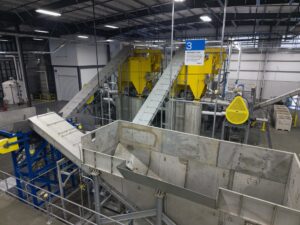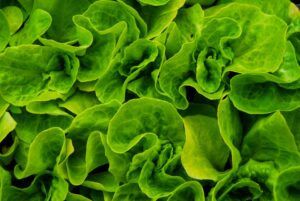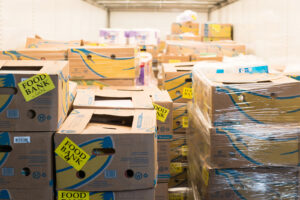April 3, 2023
A few bad strawberries here, some week-old leftovers there, dairy products way past their “Best Used By” date—no one wants to see the food they purchased go in the garbage, especially when costs are on the rise.
One third of all food produced is wasted, with 48% of that coming from consumer households. Left to rot in a landfill, food waste (or wasted food, as we prefer to think of it) contributes 8-10% of our skyrocketing global greenhouse gas emissions. Meanwhile, one in eight American households are food insecure.
We can change these numbers by being a little smarter about how we purchase, store, and use our food. Here are five things you can do to reduce wasted food at home.

1. Shop smart
Reducing your waste at home starts with how you shop.
- Go armed with a plan. Shopping for specific meals will reduce the amount of impulse purchases you make.
- Think twice about bulk-buy savings. Remember, that 5-pack of bell peppers is only a good deal if you’re going to use them all.
- Shop more often, if possible. Shopping more often with a shorter list means you get to enjoy your food while it’s at its freshest, and you’re less likely to forget those strawberries in the back of the fridge.

2. Store food properly
Food storage may seem straightforward, but are you sure you’re doing it right? Follow these tips to extend your food’s life.
- Make sure your refrigerator is set to 40°F or lower.
- Use your high-humidity drawer for veggies and your low humidity drawer for fruits.
- To prevent mold, don’t wash your berries until it’s time to eat them.
- A full fruit basket looks nice on Instagram, but remember that some fruits and vegetables don’t get along.
- Bananas, apples, pears and stone fruits can make nearby items ripen too fast.
- Onions and potatoes prefer to be kept apart from one another in a cool, dry place.

3. Understand “best-by” dates
We may think we know what the dates on food packaging mean, but do we?
- Check in with the FDA’s guide to best-by, use-by, sell-by and freeze-by dates.
- If you know you’re not going to use something by its packaging date, consider donating it to a local food pantry or community fridge.

4. Compost
Even with the best efforts to reduce wasted food at home, you’re still likely to have peels and scraps to deal with.
- Composting scraps instead of discarding them can significantly reduce methane emissions, according to the EPA.
- If you have a home garden, composting is a great way to feed essential nutrients back into the soil. Your home composting program can be a miniature circular economy right in your back yard.
- If composting sounds intimidating, here’s a great guide from NPR’s Life Kit to get you started.
- Always be sure to remove produce stickers before composting to keep microplastics out of your soil.

5. Support fellow wasted food fighters
For national retailers, taking meaningful steps to curb wasted food is costly and resource intensive. We congratulate Ahold Delhaize, Albertsons, CVS, Kroger, Safeway, Save Mart and Target for embracing the wasted food fight as a moral and environmental imperative. Through collaboration with these customers, Divert has turned would-be wasted food into 11 million pounds of donated food, and offset 900 million pounds of carbon emissions annually. Here are some things you can do to keep this movement going.
- Shop with retailers who are doing their part to end wasted food
- Thank your local store manager, or reach out on social media to let them know their efforts matter to you.
- If your favorite stores aren’t diverting their wasted food, ask them to.
Individual efforts like these may feel small in the shadow of problems as significant as food insecurity, price inflation, and global climate change, but small changes can add up to much bigger impacts. If these five tips inspired you to think about wasted food differently, share this article!
Learn More
Read about the progress Divert’s customers are making in the fight against wasted food.



